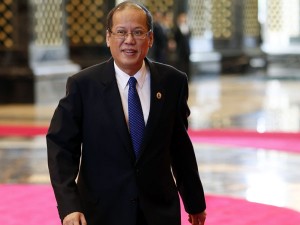Aquino reviews deployment of Filipino peacekeepers in Middle East conflicts
MANILA, Philippines – The fate of Filipino peacekeepers — holed up in Golan Heights on the Israel-Syrian border—was up in the air as President Aquino convened on Tuesday a meeting with the security cluster of his Cabinet.
At press time, Malacañang had not indicated whether it was time to pull out the 300-strong Filipino contingent to the United Nations Disengagement Observer Force (UNDOF) from Golan Heights.
However, Aquino dropped hints about his thoughts, in an ambush interview in Misamis Oriental early in the day, when he said that the heavy burden of patrolling the area was increasingly putting the UN peacekeeping troops at risk.
The Commander in Chief stressed he would like to see changes instituted soon by the UN to address “conditions” on the ground, then “the (peacekeeping) mission could be undoable and our troops would find themselves (in harm’s way) as they could be caught in the crossfire … unable to defend themselves.”
Aquino said the country had sent the Filipino contingent precisely to keep the peace in the disputed mountainous region.
Article continues after this advertisement“But if what we’re told to do is impossible, what’s the point in staying there? We can’t really accomplish the mission—that’s the (initial) assessment,” said the President.
Article continues after this advertisementHowever, Aquino still summoned Secretaries Manuel Roxas II (interior), Voltaire Gazmin (defense), Albert del Rosario (foreign relations), Executive Secretary Paquito Ochoa and Cabinet Secretary Rene Almendras, and the heads of the defense and police establishments to Malacañang for no-holds-barred discussions of the matter.
The meeting came on the heels of the latest fighting between Syrian military and rebel forces that injured two peacekeepers after an artillery or mortar shell landed at Camp Ziouni, UNDOF’s logistics base at Golan Heights.
“There was an incident the other day, when Syrian armed forces and Syrian rebels engaged in a firefight. There were mortar rounds falling on the battalion headquarters (of UNDOF) that injured one of our (peacekeeping) officials and an Indian soldier,” said Mr. Aquino.
In May, 21 Filipino peacekeepers had been seized by Syrian rebels, but they were subsequently released.
Austria’s 380-member peacekeeping force had already pulled out from the 1,000-strong UNDOF at Golan Heights, with Russia’s offer to replace Austria’s troops promptly rejected by the UN since permanent members of the UN Security Council could not take part in peacekeeping missions under the 1974 accord.
The main reason for the presence of UNDOF in Golan Heights has been to provide a buffer zone between Israel and Syria, and now, for Syrian rebels, too.
“The (contingents of) many countries have started pulling out (but) fears abound that if the whole UN detachment of UN forces pulled out, there would be no buffer (force) left between Israel and Syria. The natural progression (of forces) will allow the two to get closer to the boundary, and there might be flare up, again, of hostilities,” said Aquino.
“So there is an assessment by this (Tuesday) afternoon of all these factors, based on my instructions, and after that we will decide precisely. The main question is: Is the mission doable or not?” he asked.
He explained that part of the consideration would be the “value (of the peacekeepers) to us, especially to our countrymen, who are around that area. There is over a hundred thousand (Filipinos) within the immediate vicinity, well, of the states—in Jordan, in Syria, in Israel, etc.”
He said his administration wanted “to also help in enhancing the maintenance of relative peace within that area.”
Should the violence flare up, he predicted a “chain reaction throughout the Middle East” that could lead to higher crude prices which, in turn, could affect the Philippine economy.
“So the meeting this (Tuesday) afternoon is to thresh out if we could (still) accomplish the mission given us and the remaining forces there. Would the UN consent to provide additional either the equipment … or change what we call as standard operating procedures, so that we could enhance the security of our peacekeepers and make them stay?” he said.
“Will we be getting better equipment? Will we be getting different standard operating procedures or rules of engagement?” he asked, saying these measures could “enhance the capacity of our forces to safeguard themselves.”
Aquino had already asked for a review of all peacekeeping engagements of the Philippines in conflict zones around the world.
“For instance, I’m very concerned with the two (peacekeeping) observers from the Philippines in an area—I think it’s in South Sudan,” he said, adding that another two Filipino peacekeepers were in Jamur and Kashmir, both in India.
“So again, two peacekeepers. So what could these two persons accomplish there? What would happen to them if hostilities flare up in these places? Who are directly in-charge over them? Which (Philippine) embassy?” he said.
“So that is an ongoing process and, after an evaluation of each and every mission, then we will decide whether to continue that particular mission or not,” he added.
The country’s involvement with UN peacekeeping missions started in 1963.
But the country did not enter into “new commitments” under Aquino’s watch since all of these missions “were leftovers from (the previous administration), which … have become routinary,” he said.
